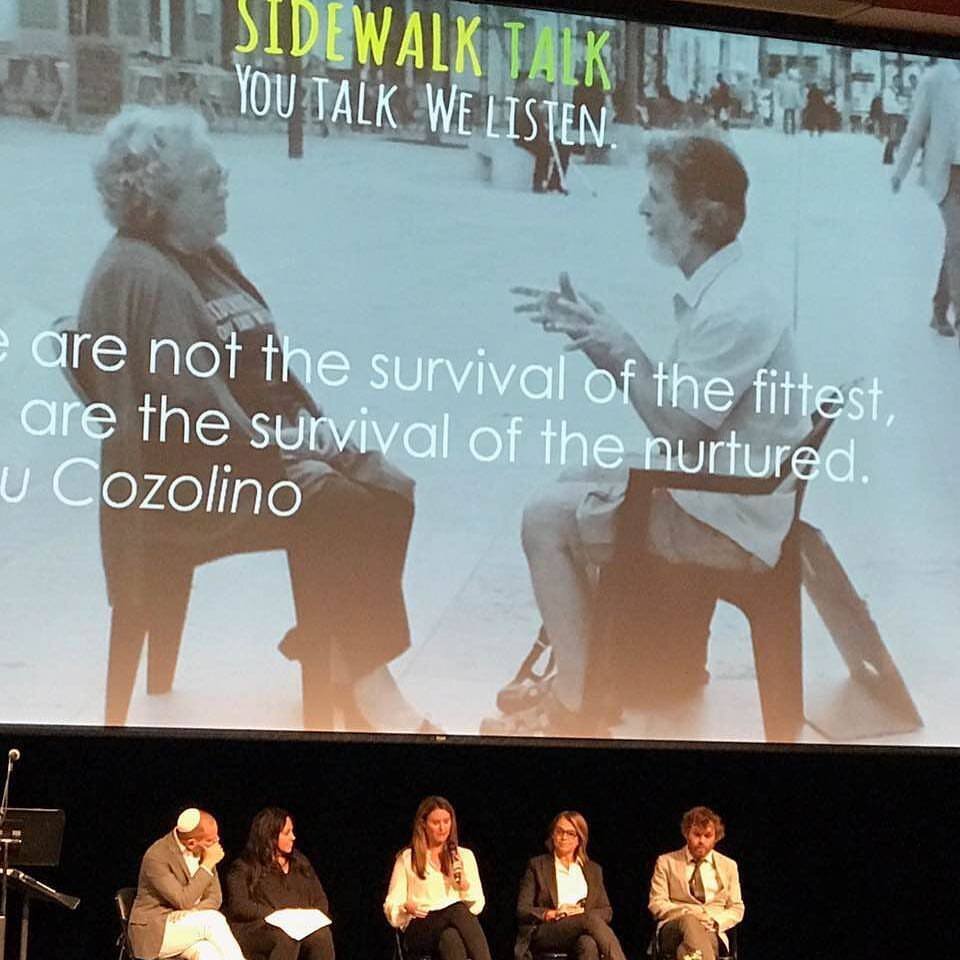4 Ways Sidewalk Talk Listening Skills Help Our Collective Mental Health
Sidewalk Talk chapter leader, Kerrie Mohr, on stage presenting Sidewalk Talk next to Esther Perel!
If you have ever wondered if our work at Sidewalk Talk matters, it does now, more than ever. The wave of folks impacted by COVID19 isolation is expected to rise and the barriers to mental health services are very real. We want to stay loving, grounded, and look towards how we can be part of the loving community that supports mental health.
Federal agencies and experts warn that a historic wave of mental-health problems is approaching: depression, substance abuse, post-traumatic stress disorder and suicide.
Just as the initial outbreak of the novel coronavirus caught hospitals unprepared, the United States’ mental-health system — vastly underfunded, fragmented and difficult to access before the pandemic — is even less prepared to handle this coming surge.
The coronavirus pandemic is pushing America into a mental-health crisis -The Washington Post
Sidewalk Talk is laying the groundwork to be a vehicle to support communities for years to come. We are a place of love, support, care, play, joy, and togetherness that communities trust. The connections we facilitate through Sidewalk Talk heart-centered listening is preventative. It is a vaccine for depression and anxiety.
Now, more than ever, Sidewalk Talk needs your support to create more communities of love online and on sidewalks. We have a matching grant from SimplePractice and A Good Place Therapy in Manhattan. Every dollar counts.
Give to Sidewalk Talk here so we can keep listening with heart and be the loving vaccine for depression and anxiety.
Over the last few months, I have had the honor to interview experts in the field of listening, compassion, and loneliness for the Sidewalk Talk podcast.
Here is what we know: active listening is a skill...a set of behaviors that helps you get good at mirroring someone. But skills may not translate to meaningful impact if they do not elicit an inner change of heart inside the listener and talker.
Developing sincerity of heart when listening requires something much more than skills. And when we do, we improve the mental health of those we offer to listen to with our whole hearts.
Dr. Harry Reis from the University of Rochester has been studying intimacy and loneliness for a long time. He said, that becoming a good listener requires you to develop more self-knowledge to show up sincerely. You have to know about your neurosis, your intimacy fears, and the different ways you might be biased or primed to judge others.
We don’t improve our listening from a change in behavior but from a change of heart.
I am sure you have been on the receiving end of “active listening” which felt robotic. To listen well, our whole tender hearts must get in on the action. And we have to practice this kind of listening regularly. Both of those are the key ingredients to what we do at Sidewalk Talk.
We now study the impact of our listening and skills training and refine and improve all the time with the help of Dr. Guy Itzhakov who studies listening in the workplace.
Research shows there are links between mental health and wellbeing and being listened to well. Sidewalk Talk listeners receive special training to listen with heart and sincerity that impacts mental health greatly.
4 Ways Sidewalk Talk Listening Skills Improve Mental Health
Being the recipient of good listening lowers anxiety - both state anxiety and social anxiety.
When difficult conversations are peppered with lots of sincere listening, the speaker self-esteem goes up and the speaker feels empowered to advocate for themself in a meaningful and relational way.
When we are listened to with heart, our sense of relatedness or belonging goes up which directly links to one’s well-being.
Good listening turns the volume down on the brain’s tendency to judge people or situations as bad, wrong, or dangerous. It turns down the negativity bias which can get us to behave in ways that would be harmful to our mental health and our relationships.
If you have not taken the Sidewalk Talk Listener Training, we are giving away a free module on listening and setting boundaries for Mental Health Awareness Month. Access Training Module FREE here.
And if you want to become a Sidewalk Talk Listener, join here, and for the month of May, our chapter leaders will be coming live in our Facebook listener’s group to review a different listener training module each week and take your questions live. Become a donor listener here.
At Sidewalk Talk, we imagine a world where millions of people walk the earth who know how to HEAR each other with heart. A world like that is a world that creates mental health for all. What a world that would be.

